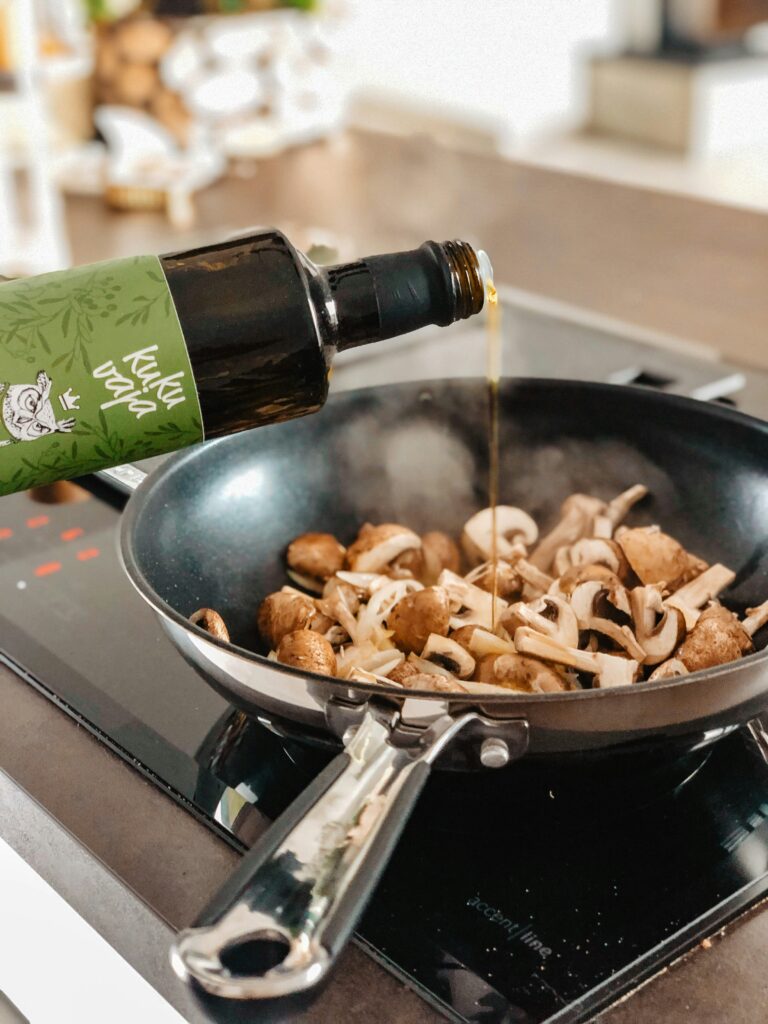Have you ever stood in the cooking oil aisle at your grocery store, completely overwhelmed by the endless choices? You aren’t alone. Cooking oils are an essential part of your kitchen, contributing flavor and nutrition to your meals. But with so many options, how do you choose the best ones for your health? This guide seeks to unravel the mysteries surrounding cooking oils and help you make informed decisions the next time you shop.

What are Cooking Oils?
Cooking oils are plant, animal, or synthetic fats used in frying, baking, and other types of cooking. They are also used in food preparation and flavoring not involving heat, such as salad dressings and bread dips. Each oil type varies in smoke point, nutritional content, and health impact, which makes selecting the right one crucial for cooking and maintaining a healthy lifestyle.
Understanding Smoke Points
What is a Smoke Point?
The smoke point of an oil is the temperature at which it begins to smoke and break down. This transformation changes the flavor and nutritional content of the oil, so it’s important to match the smoke point with your cooking method. Oils that are ideal for frying have high smoke points, reducing the risk of burning and releasing harmful free radicals.
Why Do Smoke Points Matter?
Using oils beyond their smoke point can generate toxic fumes and harmful free radicals that can negatively impact your health. Therefore, using oils with the appropriate smoke point for your cooking method helps retain the oil’s nutritional value and prevents unpleasant flavors in your food.
Common Smoke Points
Here’s a quick look at the smoke points of some popular oils:
| Oil Type | Smoke Point (°F) | Suitable For |
|---|---|---|
| Olive Oil (Extra Virgin) | 320-375 | Sautéing, low-heat baking |
| Coconut Oil | 350 | Baking, light sautéing |
| Butter | 350 | Baking, light sautéing |
| Canola Oil | 400 | Frying, baking |
| Avocado Oil | 520 | Frying, grilling |
Types of Cooking Oils
Cooking oils can be broadly categorized into plant-based oils, animal fats, and synthetic fats. Each type has its own set of health benefits and culinary uses.
Plant-Based Oils
Olive Oil
Olive oil, derived from pressed olives, is a staple in many kitchens. It’s known for its heart-healthy monounsaturated fats and antioxidants. Extra virgin olive oil, in particular, is less processed and retains a higher concentration of nutrients and flavor compounds. It’s best used for salad dressings, drizzling on finished dishes, or low-heat cooking.
Coconut Oil
Coconut oil is another plant-derived option that’s gained popularity. Extracted from the meat of mature coconuts, it contains saturated fats, making it stable at higher temperatures. It’s often used in baking and adds a distinct flavor to dishes.
Avocado Oil
Made from pressed avocados, avocado oil is rich in monounsaturated fats and vitamin E. It’s a versatile cooking oil with a mild flavor and is excellent for high-heat cooking methods like frying or grilling due to its high smoke point.
Canola Oil
Extracted from the seeds of the canola plant, this oil is low in saturated fats and high in omega-3 fatty acids. Its neutral flavor and relatively high smoke point make it a versatile choice for various cooking techniques.
Animal Fats
Butter
Butter is cherished for its rich flavor and is often used in baking and cooking at medium temperatures. It is made by churning cream and contains saturated fats.
Lard
Rendered from pork fat, lard is ideal for frying and baking, imparting a flaky texture to pastries. It contains both saturated and unsaturated fats and is an old favorite for traditional recipes.
Synthetic Fats
Margarine
Margarine is a processed fat product made from vegetable oils, designed to mimic butter. Although it was initially created as a healthier alternative, modern health advice often cautions against excessive consumption due to its trans fat content.
Nutritional Content of Cooking Oils
Healthy Fats
Known as monounsaturated and polyunsaturated fats, these are the fats you want to emphasize in your diet. They contribute to heart health, reduce inflammation, and provide essential fatty acids and vitamins.
Saturated Fats
These fats are more stable and can withstand higher cooking temperatures, but their consumption should be moderated since they have been associated with increased cholesterol levels.
Trans Fats
Trans fats are harmful synthetic fats found in partially hydrogenated oils. They should be avoided when possible due to their negative impact on heart health.
Essential Nutrients
Cooking oils can be a source of essential nutrients, including vitamin E and omega-3 and omega-6 fatty acids. Including a variety of oils in your diet can help you obtain these nutrients.

Health Benefits of Different Cooking Oils
Olive Oil
Renowned for its role in the Mediterranean diet, olive oil supports heart health through its antioxidant and anti-inflammatory properties. The monounsaturated fats in olive oil can help lower bad cholesterol levels.
Coconut Oil
While rich in medium-chain triglycerides, which are metabolized quickly to provide energy, coconut oil should be used in moderation due to its high saturated fat content.
Avocado Oil
Avocado oil helps reduce cholesterol levels and improves skin and hair health due to its high vitamin E content. It promotes nutrient absorption, making it a beneficial addition to salads.
Canola Oil
Its low saturated fat content and high omega-3 fatty acid levels support cardiovascular health. Canola oil is often used in cooking for its neutral flavor and high smoke point.
How to Choose the Right Cooking Oil
Cooking Method
Consider how you’ll be cooking. High-heat methods like frying require oils with higher smoke points, while low-heat methods allow for oils with lower smoke points.
Flavor
Different oils impart different flavors—choose one that complements your dish. For example, olive oil works well in Mediterranean dishes, while coconut oil is perfect for tropical recipes.
Health Needs
If you have specific dietary needs, such as a focus on heart health, prioritize oils high in monounsaturated fats and low in saturated fats.

Storing Cooking Oils
Proper Storage
To extend the life of your cooking oils, store them in a cool, dark place. High-quality oils, like extra virgin olive oil, may be kept in the refrigerator to preserve freshness.
Shelf Life
Different oils have varying shelf lives. It’s best to check expiration dates and consume your oils within the advised time frame. Rancid oils not only lose taste but can also pose health risks.
Common Myths About Cooking Oils
All Oils are Unhealthy
Not true! While it’s essential to use oils moderately, many cooking oils offer health benefits when consumed in the right amounts.
Saturated Fats Should Be Avoided
While high intake of saturated fats isn’t recommended, some saturation isn’t harmful, especially if you’re also consuming unsaturated fats and maintaining a balanced diet.
Olive Oil Can’t Be Used for Cooking
While olive oil has a relatively low smoke point, it’s perfectly safe and beneficial to use in low to medium-heat cooking. You can also find more refined versions with higher smoke points for broader use.

Environment and Sustainability
Production Impact
The cultivation and production of certain oils can have a significant environmental impact. For example, palm oil production has been linked to deforestation. It’s important to choose sustainably sourced oils when possible.
Packaging
Consider opting for oils packaged in glass bottles to reduce plastic waste. Some brands also offer refill stations or bulk options, encouraging a more sustainable lifestyle.
Ethical Considerations
Supporting brands that engage in fair trade and sustainable practices can help ensure the livelihoods of farmers and the health of the environment.
FAQs About Cooking Oils
How Often Should I Change My Cooking Oil?
For the freshest flavor and best health benefits, change your oil every few months, especially after it develops an off smell or taste.
Can I Reuse Cooking Oil?
Reusing oil should be done cautiously. After frying, oils can degrade and form harmful compounds. If you must reuse, filter the oil and store it properly, ensuring it’s only reused a couple of times.
Which Oil is Best for My Diet?
The “best” oil depends on your individual dietary needs. Those focused on heart health may opt for olive or canola oil, while those requiring higher calorie intake may choose coconut or avocado oil.
By understanding the different types of cooking oils, their nutritional benefits, and proper usage, you can make more informed choices that align with your health goals and culinary preferences. Next time you’re standing in front of the cooking oil shelves, you’ll have the knowledge to pick the best one for every dish you create.

 10 Simple Self-Care Practices For Stress Relief
10 Simple Self-Care Practices For Stress Relief  How To Create A Mindfulness Routine For Beginners
How To Create A Mindfulness Routine For Beginners  How To Incorporate Self Care Into Your Daily Life
How To Incorporate Self Care Into Your Daily Life  How To Practice Self Compassion: Tips And Techniques
How To Practice Self Compassion: Tips And Techniques  The Benefits Of Mindfulness For Personal Growth
The Benefits Of Mindfulness For Personal Growth  How To Practice Mindfulness Daily
How To Practice Mindfulness Daily  How To Create A Skincare Routine For Oily Skin
How To Create A Skincare Routine For Oily Skin  The Best Ingredients For Anti-Aging Skincare
The Best Ingredients For Anti-Aging Skincare  10 Skincare Myths That Are Wrecking Your Glow—Debunked by Experts
10 Skincare Myths That Are Wrecking Your Glow—Debunked by Experts  Natural Skincare 101: Everything you Need to Know
Natural Skincare 101: Everything you Need to Know  The Ultimate Guide To Sunscreen: What You Need To Know
The Ultimate Guide To Sunscreen: What You Need To Know  Best Anti-Acne Products: A Comprehensive Buyers Guide
Best Anti-Acne Products: A Comprehensive Buyers Guide